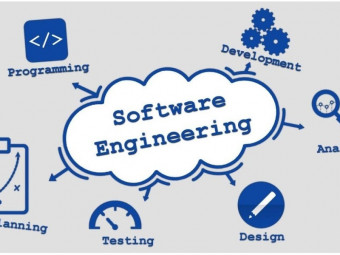Agile Project Management Overview For Project Managers
Tags: Agile
Learn How to Blend Agile and Traditional Project Management to Create an Adaptive Approach to Project Management
Last updated 2022-01-10 | 4.4
- Develop an objective understanding of the strengths and weaknesses of both an Agile and traditional plan-driven approach to project management and how they can be combined in the right proportions to fit any given situation in an integrated approach to Agile Project Management- Learn what's fundamentally different about Agile Project Management and the shifts in thinking that project managers might need to make to operate successfully in an Agile environment
- Better understand the impact of Agile on the project management profession
- the new challenges that Agile creates for project managers
- and the potential roles that an Agile Project Manager can play
What you'll learn
* Requirements
* Students should have some general familiarity with both traditional plan-driven project management and Agile methodologies.* It is highly recommended that students take my Udemy course "Understanding Agile at a Deeper Level'" before taking this course
Description
Important:
This course is part of an integrated, university-level curriculum of seven courses (See details below). This course is the fifth course in that series and should be taken in sequence. Please take the prerequisite courses before taking this course.
Course Statistics:
Over 125,000 students in my courses!
Over 7,000 5-star reviews in my courses!
Earn PDU's: Students who complete this course are eligible to receive 7.0 PDU's in PMI continuing education credits. Instructions for claiming PDU's are provided with the last lesson in the course.
Qualify for PMI-ACP Certification: Completion of all seven courses in this series will meet the requirement for 21 hours of training to qualify for PMI-ACP certification.
Money-back Guaranty: Try this course and if you are not satisfied with the value you received from the course, just send an email to Udemy support and they will give you a 100% refund within 30 days.
Course Summary: Learn how to blend Agile and traditional plan-driven project management principles and practices in the right proportions to fit any situation!
The concept of Agile Project Management is very rapidly evolving and will have a significant impact on the project management profession; however, we are in the early stages of that transformation and there is a lot of confusion about what impact it has on project managers. This course will help you unravel a lot of the confusion that exists; develop a totally new perspective to see both Agile and traditional project management principles and practices in a new light as complementary to each other rather than competitive; and learn to develop an adaptive approach to project management to blend those principles and practices together in the right proportions to fit any situation.
This course is part of a sequence of courses that are designed to cover most of the knowledge required for PMI-ACP® certification but the courses present that knowledge in a very practical, real-world context to provide a much deeper understanding of the principles behind it. The course also includes a number of case studies to show how to apply this knowledge in a typical real-world situation.
Special Note:
This course is part of an overall curriculum that is designed around helping students develop the skills required for a high-impact Agile Project Management role. Most students will want to take the complete curriculum rather than individual courses. The complete curriculum should be taken in the following order:
Agile PM 101 - Learn the Truth About Agile versus Waterfall
Agile PM 102 - What's the Future of Agile Project Management?
Agile PM 201 - Understanding Agile at a Deeper Level
Agile PM 202 - Introduction to Agile Project Management
Agile PM 301 - Mastering Agile Project Management
Agile PM 401 - Advanced Agile Project Management
Agile PM 402 - Enterprise-level Agile Project Management
Students who complete the entire curriculum of all seven courses shown above will receive a signed certificate of completion from the Agile Project Management Academy. The complete set of seven courses will also meet the 21 hours of training required for PMI-ACP certification.
____________________________________________________________________________________________________________________________________________
PMI-ACP Certification Course
In addition, there are one optional courses that is designed to supplement the above curriculum for students who are interested in PMI-ACP certification:
How to Prepare for PMI-ACP Certification is intended for students who are interested in using this curriculum to prepare for PMI-ACP certification
____________________________________________________________________________________________________________________________________________
Agile Business Management Curriculum
There is also a condensed version of this curriculum that is designed for any business people who are involved in Agile projects including Product Owners, Business Sponsors, and Business Analysts
Introduction to Agile Business Management
Mastering Agile Business Management
Enterprise-level Agile Business Management
Note: These courses for Agile Business Management are an abridged version of the Agile Project Management courses and there is no need to take both
Who this course is for:
- Anyone who is interested in developing a well-integrated Agile Project Management strategy for their organization to align an Agile development approach with the company's business
- Project Managers who want to learn how Agile impacts the project management profession and want to develop a more adaptive approach to project management to enhance their project management skills and develop new opportunities for career growth
Course content
11 sections • 76 lectures
Introduction Preview 05:00
This lecture provides an introduction to the course and goes over the course objectives
Review of Traditional Project Management Estimation Practices Preview 05:35
Project Estimation Best Practices Preview 11:50
This lecture discusses project estimation best practices and how they're different between an Agile environment and a traditional, plan-driven environment
Time-boxing and Time-boxing Advantages Preview 04:48
This lecture explains why time-boxing makes sense in an Agile environment and explains the advantages of a time-boxing approach
Agile Time-boxing Quiz
This quiz is a brief review of topics related to the Agile Time-boxing lecture
General Agile Estimation Approach Preview 07:45
This lecture discusses the essential differences of a general Agile estimation approach
Story Points and Velocity Preview 04:53
This lecture explains how story points and velocity are used in Agile as part of an estimation process
Definition of Done and Definition of Ready Preview 05:30
This lecture explains the concept of the "Definition of Done" and the "Definition of Ready" and why they are important in an Agile estimation process
Wideband Delphi and Planning Poker Preview 04:48
This lecture discusses the Wideband Delphi method and Planning Poker which is a very popular Agile estimation method
Estimation by Analogy and Relative Sizing Preview 09:16
This lecture discusses the Estimation by Analogy method and the Relative Sizing estimation method
Agile Estimation Example Preview 04:59
This lecture discusses a complete example of a small-scale Agile estimation exercise
Agile Estimation Quiz
This quiz is a brief review of topics related to the Agile Estimation lecture
Overview of Project Risk Management Preview 10:45
This lecture provides an overview of project risk management and how it is different in an Agile environment.
Agile Risk Identification Part 1 Preview 08:31
This lecture is the first of two parts on Agile Risk Identification. Risk Identification is the first phase of the overall Risk Management lifecycle.
Agle Risk Identification Part 2 Preview 08:33
This lecture is part 2 of two parts on Agile Risk Identification. Risk Identification is the first phase of the overall Risk Management lifecycle.
Project Risk Analysis Preview 07:56
This lecture is focused on Project Risk Analysis which is the second phased of the overall Risk Management lifecycle.
Project Risk Response Preview 06:56
This lecture is focused on Project Risk Response which is the third phase of the overall Risk Management lifecycle.
Monitoring and Controlling Risks Preview 05:30
This lecture is focused on monitoring and controlling risks which is the fourth and last phase of the overall Risk Management lifecycle.
Agile Risk Management Summary Preview 03:00
This lecture provides an overall summary of Agile Risk Management.
Agile Risk Management Quiz
This quiz provides a brief review of some important topics related to Agile Risk Management
Overview of Project Management Metrics Preview 06:28
How Are Agile Metrics Different? Preview 07:12
This lecture discusses how metrics are different in an Agile environment
Project Progress Metrics Preview 06:27
This lecture is focused on project progress metrics
Baseline Metrics and Project Scope Preview 02:11
This lecture is focused on metrics related to project baseline and project scope management
Risk Management Metrics Preview 01:49
This lecture is focused on metrics related to risk management
Project Profitability Metrics Preview 11:23
This lecture is focused on metrics related to Project Profitability
Earned Value Metrics Part 1 Preview 06:38
This lecture is part 1 of two parts on Earned Value Metrics
Earned Value Metrics Part 2 Preview 11:00
This lecture is part two of two parts on Earned Value Metrics
Team Productivity Metrics Preview 10:33
This lecture is focused on metrics related to Team Productivity
Quality and Customer Satisfaction Metrics Preview 06:07
This lecture is focused on metrics related to quality and customer satisfaction
Agile Metrics Summary and Best Practices Preview 06:05
This lecture provides a summary of the topics in this section as well as a discussion of best practices related to Agile metrics
Agile Metrics Quiz
This quiz provides a brief review of topics related to Agile Metrics
Overview of Agile Communications Preview 09:47
This lecture provides an overview of Agile Communications Practices and how they are different
Effective Communications Traits and Skills Preview 06:23
This lecture provides a summary of traits and skills that are essential for effective communications
Information Radiators Preview 04:57
This lecture provides a summary of Information Radiators and how they are used in an Agile Communications strategy
Agile Team Space Preview 04:41
This lecture provides an overview of Agile Team space and how it is used in a typical Agile project environment
Face-to-Face Communications Preview 05:30
This lecture is on Face-to-Face communications and the role it plays in an Agile project
Collocated and Distributed Teams and Daily Standups Preview 03:13
This lecture is on collocated and distributed teams and how it impacts an Agile Communications strategy as well as Daily Standups
Agile Communications Practices Quiz
The Importance of Collaboration Preview 04:30
Types of Communication and Collaboration Tools Preview 05:01
Wiki's and Document Sharing Tools Preview 07:50
The Influence of Social Media Preview 05:34
An Example of a Communication and Collaboration Tool Preview 05:28
How to Use Communication and Collaboration Tools Preview 04:03
Agile Communications and Collaboration Tools Quiz
This quiz is a quick review of some selected practices related to Agile Communications and Collaboration Tools
Overview of Agile Project Management Tools Preview 11:32
Capabilities of Team-level Agile Project Management Tools Preview 03:33
Team-level Tool Demo Preview 11:19
Capabilities of Enterprise-level Agile Project Management Tools Preview 08:50
Enterprise-level Tool Planning Demo Preview 06:37
Enterprise-level Tool Tracking Demo Preview 04:05
Agile Project Management Tools Quiz
This quiz is a brief review of topics related to the Agile Project Management Tools lecture
Overview of Agile Development Practices Preview 04:46
Agile Architecture Preview 09:26
Code Refactoring Preview 06:52
Continuous Integration Preview 05:21
Pair Programming Preview 03:42
Test-driven Development Preview 02:21
Agile Prototyping Preview 07:17
Agile Development Practices Quiz
Overview of Agile Quality and Testing Practices Preview 05:10
Definition of "Done" and Definition of "Ready" Preview 07:33
The Role of QA Testing in an Agile Project Preview 04:58
Types of Testing Preview 08:30
Acceptance Test-driven Development Preview 04:14
Repeatable Tests and Automated Regression Testing Preview 03:32
Value-based and Risk-based Testing Preview 01:39
Agile Quality and Testing Practices Quiz
Agile and PMBOK Part 1 Preview 10:08
This lecture is part 1 of 2 parts that provide a high-level comparison of PMBOK knowledge areas to Agile
Agile and PMBOK Part 2 Preview 13:03
This lecture is part 2 of 2 parts that provide a high-level comparison of PMBOK knowledge areas to Agile
Agile and PMBOK Quiz
This quiz is a brief review of topics related to the Agile and PMBOK lecture
Student Case Study Preview 00:37
This lecture contains an optional homework assignment to do a case study on a project from your own experience.
Overall Summary and Resources to Help Preview 06:42
In this lecture we will provide a wrap-up of the major points that have been covered in this course. We will also discuss some of the resources that are available for further developing and implementing the ideas in this course
How to Claim PDU's Preview 00:05
Please download the attached document on "Instructions for Claiming PDU's" for instructions on how to claim PDU's for this course.








 This course includes:
This course includes:














